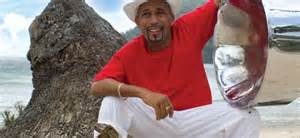
In the world of pan, there are only a handful of players that can say they have reached the pinnacle of the art form (although none would actually ever say it). Such is the case with legendary player and arranger, Ken “Professor” Philmore.
As arranger for Fonclaire Steel Orchestra, “Proff,” as pan insiders call him, is responsible for some of the most memorable Panorama music ever composed. Past hits have included “Pan By Storm” (1990), “Pan Ecstacy” (1991), and “Pan in the Party” (1992). Musically, Philmore’s style can be summed up as fast, furious, and fun with a consistent mix of calypso melodies infused with jazz licks and an almost guaranteed hip bass solo.
With a passionate, energetic performance style that is virtually unmatched, “Proff” has consistently proven himself to be one of the elite pan soloists in the world. PM was able to sit down with Philmore for this exclusive interview to learn more about his history, compositions and thoughts on the current state of pan.
How did you first discover pan?
I first discovered pan at a J’ouvert competition which I attended with neighbors at age 7. J’ouvert is a festival within our carnival season, where costumes are paraded and steelbands also parade between 4am – 8am. I immediately fell in love with the sound.
What about the instrument convinced you that you wanted to be a pan player?
I believe it was some sort of divine intervention. I was mesmerized by every aspect of what I saw on that J’ouvert morning.
Where did you grow up and what was your childhood like?
I grew up in San Fernando, in the South of Trinidad. I came from a very humble background. My circumstances were very challenging as pan back in those days was associated with vagabonds.
What are your biggest musical influences, for both pan and other instruments?
My biggest musical influences came from Calypsonians such as Squibby, Lord Kitchener. Pioneers like Clive Bradley, Steve Achaiba, Milton “Wire” Austin and Jazz greats such as the Duke Ellington Orchestra, George Benson, Joe Sample, Bob James and Grover Washington to name a few.
How did you develop your musical style?
I am self-taught. I believe that “practice makes perfect”. As a young musician, I treated my career as a job, spending as long as eight hours daily in practice.
What is your favorite self-composed or arranged piece?
My favorite self-composed and arranged piece is Pan By Storm, which I did in 1990 with Fonclaire Steel Orchestra.
What moment in your life made you feel like you had made it and finally landed where you wanted to be?
I have never truly experienced such a moment as I believe that one can never stop learning those 12 notes in one lifetime.
What has been the biggest challenge for you as a professional pannist and arranger?
My biggest challenge is not seeing pan as part of the curriculum in every school in Trinidad and Tobago where the instrument originated.
What are your thoughts on the current state of pan, both in Trinidad and abroad?
My opinion of that is two fold. I believe our children are deprived of the joy of playing and learning this wonderful instrument as it’s not a part of the curriculum and Trinidad and Tobago is the mecca of pan. On the other hand, thanks to the pioneers who took our great artform worldwide, today over 70 countries are playing pan. So, it’s rapidly growing abroad.
Are there improvements you’d like to see regarding the notoriety of the instrument in the world?
We are on the right course. The standardization of the instrument is coming along slowly but surely. The sound of the instrument has improved tremendously over time. Lots of countries are embracing it.
How do you feel about Panorama and the direction it’s going?
I believe over the years the fierceness of the competition has separated rather than united the pan fraternity.
Are there any improvements you’d like to see in the future? If so, what?
I would like to see large corporate entities getting more involved with pan, making it easier to spread the joyous sound and knowledge of the instrument, worldwide.
What are your goals in five years?
My goal is simply to spread the music into yet unknown territory and to open a pan school to continue the teaching of the art form.
Ken “Professor” Philmore performs on Showtime at the Apollo.









